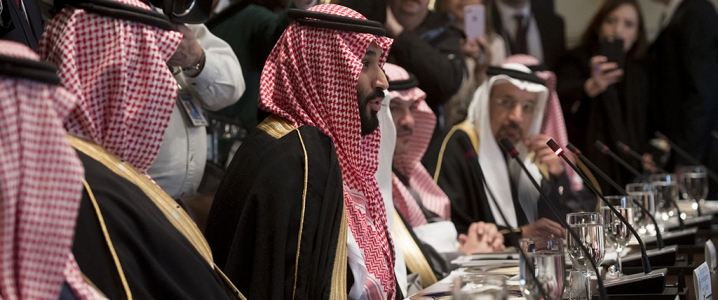Higher oil prices have provided a boost to the economies of oil-exporting nations such as Saudi Arabia. But the economic risks going forward are “skewed to the downside,” the International Monetary Fund said in a new report, in which it urged Saudi Arabia and other oil exporters to press on with reforms.
Oil price volatility, trade tensions, geopolitical risk and a “sharp tightening of global financial conditions” are just a few of the potential pitfalls that lie ahead.
But the IMF paid extra attention to the debt levels of some oil producers. “The tightening of global financial conditions, if interest rates will continue to go up and liquidity will be less available, this will affect countries with a high level of debt — mainly oil importing countries where the average debt exceeds 80 percent (of gross domestic product)," Jihad Azour, director of the Middle East and Central Asia Department at the International Monetary Fund, told CNBC on Monday.
"Last but not least, some countries have succeeded in implementing reforms but what is important is to keep the momentum there and to address some of the structural issues," Azour said. He believes that the "region needs to create at least 25 million jobs for the young generation in the next five years”. Related: Is The Golden Era For Renewables Around The Corner?
The IMF said that Saudi Arabia needs to continue “structural reforms,” largely referring to the Vision 2030 plan spearheaded by crown prince Mohammed bin Salman. New taxes, deficit reduction, labor market reforms and investments in non-oil sectors of the economy are crucial.
While the economies of oil exporters have improved as oil prices have jumped to a three-year high, economic growth “is projected to remain well below its pre-2014 oil shock levels,” the IMF said. High levels of debt will act as a drag on the economy, limiting the extent to which governments can spend to improve short-term demand.
And for Saudi Arabia, oil prices are still too low to fully balance the books. The IMF claims that the Kingdom needs about $88 per barrel to balance its budget, up sharply from $70 per barrel last year. The sudden jump in the fiscal breakeven price is the result of an increase in spending expectations.
Saudi Arabia’s GDP growth rate is expected to rise to 1.7 percent this year, after shrinking by 0.5 percent in 2017. But, as the IMF warns, the improved outlook is largely due to the uptick in government spending. “This expected acceleration in growth is not a free lunch – the government is picking up the bill,” said Ziad Daoud, chief Middle East economist for Bloomberg Economics. “The old model of an economy driven by government spending and financed by oil hasn’t really changed.”
Still, some are unmoved by the IMF’s warnings. Ellen R. Wald, an expert on the Saudi oil sector, wrote in Forbes last year – after a previous warning from the IMF – that the concerns are overblown. Saudi Arabia has plenty of cash reserves, Saudi Aramco has low production costs and the budget deficit has shrunk dramatically, she argued. And in any event, taking on debt is a normal thing that modern countries do. Related: Citi: U.S. To Become World’s Top Oil Exporter
Moody’s reaffirmed Saudi Arabia’s “A1” credit rating on Wednesday, noting that the economic outlook was “stable.”
While some dismiss the short-term concerns related to the Saudi budget deficit, the IMF’s concerns about diversifying away from oil over the long-term are legitimate.
Saudi officials shrugged off the warnings from the IMF. Saudi Arabia responded to the advice from the IMF by saying that the rise in oil prices won’t change the course that it has charted towards economic diversification. "Higher oil prices will only help reduce the deficit and build reserves, we will continue our reform," Saudi finance minister Mohammed bin Abdullah Al-Jadaan told CNBC on Wednesday. "I assure you that there is a lot of excitement about reform and when you see results you get more energy to do more because you can see that it's working and helping the economy,".
By Nick Cunningham of Oilprice.com
More Top Reads From Oilprice.com:
- Cheap Hydrogen Could Soon Become A Reality
- How Oil Hedging Could Cost Companies $7 Billion
- Could Oil Actually Hit $300?



















There. Because in early 2016 Saudi Arabia said (unlike any other producer) that they can still be profitable at $10/bbl. I'm not going to get into the play-by-play up to where we are now, but evidently $70 oil is not enough (even though it is already here and that is 7 times as much as what they bragged they can still pump at to break-even just 2 years ago).
Just recently, it was $80...with a "happy" price at $100/bbl. Today's articles skip the all-time adjusted-for-inflation highs of $147 (more than double that, actually) of $300. What's next? $1,000 oil?
Well, let's see...right now a contract of WTI for June delivery is $2,530 + commission and fees round-trip. So, to trade oil (as to be the one to actually move prices) a contract holds 1,000 bbl. $2,530 / 1,000 bbl = $2.53. Perhaps prices should be a bit closer to what the market pays per barrel as opposed to what the already over-privileged Saudis demand from the entire world to pay for.